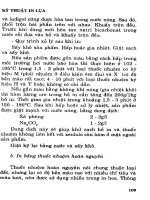Graphical user interfaces for Python programs Phần 6 ppsx
Bạn đang xem bản rút gọn của tài liệu. Xem và tải ngay bản đầy đủ của tài liệu tại đây (141.48 KB, 1 trang )
FORMAT STRINGS 321
Because of the great variability of each architecture’s C++ compilers, I am not going to
try to provide a cookbook to solve the various problems. However, I am going to present some
code fragments that have worked for Solaris.
To get a module to compile with C++, you need to define the Python API as a C segment
to the C++ compiler:
extern "C" {
#include "Python.h"
}
Then, the init function must be given the same treatment:
extern "C" {
DL_EXPORT(void)
initstatistics()
{
Py_InitModule("statistics", statistics_methods);
}
}
14.5 Format strings
Format strings provide a mechanism to specify the conversion of Python types passed as argu-
ments to the extension routines. The items in the string must match, in number and type, the
addresses supplied in the
PyArg_ParseTuple() call. Although the type of the arguments is
checked with the format string, the supplied addresses are not checked. Consequently, errors
here can have a disastrous effect on your application.
Since Python supports long integers of arbitrary length, it is possible that the values can-
not be stored in
C long integers; in all cases where the receiving field is too small to store
the value, the most significant bits are silently truncated.
The characters
|, :, and ; have special meaning in format strings.
"|" This indicates that the remaining arguments in the Python argument list are optional.
The C variables corresponding to optional arguments must be initialized to their default
value since
PyArg_ParseTuple leaves the variables corresponding to absent arguments
unchanged.
":" The list of format units ends here; the string after the colon is used as the function name
in error messages.
";" The list of format units ends here; the string after the colon is used as the error message
instead of the default error message.

![[HeadWay] Phrasal Verbs and Idioms - Oxford University phần 6 potx](https://media.store123doc.com/images/document/2014_07/13/medium_lde1405243209.jpg)
![[HeadWay] Phrasal Verbs and Idioms - Oxford University phần 8 ppsx](https://media.store123doc.com/images/document/2014_07/13/medium_kna1405243210.jpg)





![[Công Trình Cao Tầng] Công Nghệ Ván Khuôn Trượt - Bùi Mạnh Hùng phần 6 ppsx](https://media.store123doc.com/images/document/2014_07/13/medium_awk1405268448.jpg)
![[Xây Dựng] Giáo Trình Hệ Thống Đường Ống Cấp Thoát Nước - Ks.Đỗ Trọng Miên phần 6 ppsx](https://media.store123doc.com/images/document/2014_07/14/medium_zmx1405275661.jpg)